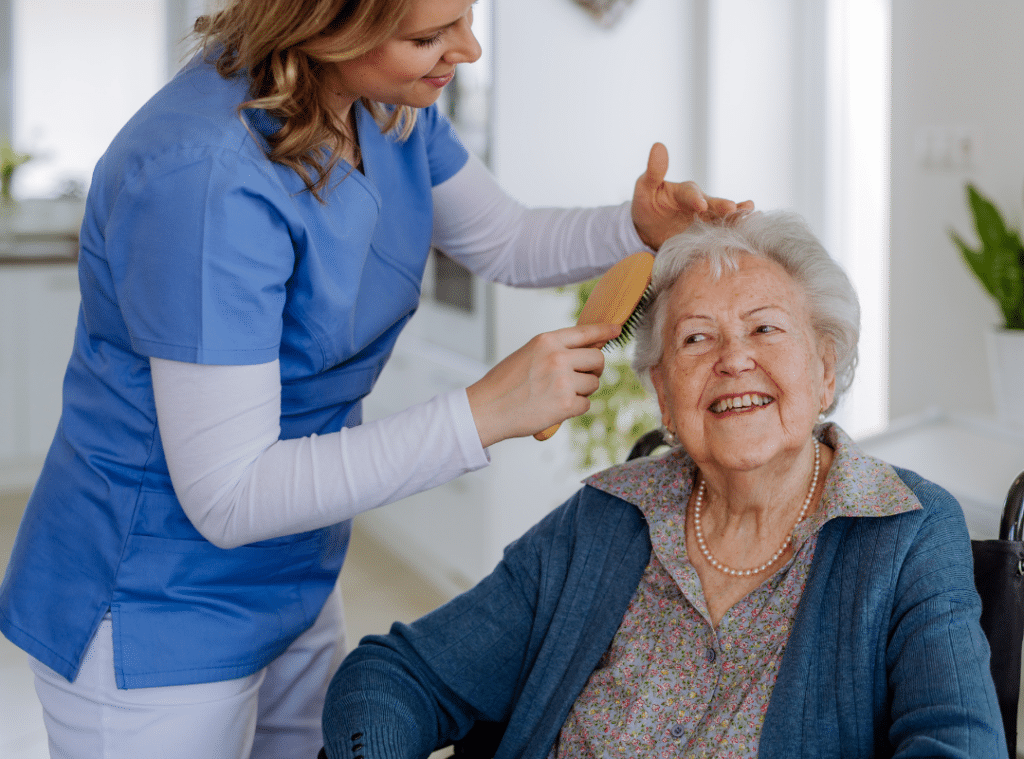Why an Assisted Living Caregiver Is Key to Elderly Comfort
Picture a peaceful setting where every need is anticipated and every concern addressed with care. An assisted living caregiver from Westmont of Culver City plays a crucial role in ensuring the comfort and well-being of the elderly, offering a level of support that goes beyond mere assistance. As you navigate the complex web of elderly care, you’ll soon realize the essential value these caregivers from Westmont of Culver City bring to the table. Their role extends far beyond the physical sphere, encompassing a holistic approach that nurtures and uplifts. Explore the depths of this important connection that shapes the essence of elderly comfort and quality of life at Westmont of Culver City.
Personalized Care Assistance
When providing personalized care assistance to elderly individuals in assisted living facilities, it’s important to tailor your approach to meet their specific needs and preferences. Each resident deserves individualized attention and a comprehensive approach to their care. By offering tailored support and specialized care, you can make sure that their unique requirements are met effectively. Taking a comprehensive approach means considering all aspects of a person’s well-being – physical, emotional, mental, and social. This involves not only addressing their medical needs but also their emotional and social needs. Engaging them in activities they enjoy, spending quality time listening to their stories, and providing companionship are essential elements of specialized care. The inclusion of trained staff in Memory Care Living ensures that residents receive compassionate and effective care.
Companionship and Emotional Support
As an assisted living caregiver, you play a crucial role in establishing emotional bonds with the elderly residents under your care. Your companionship and emotional support can be the key to preventing feelings of loneliness and isolation, contributing to their overall well-being and comfort. Companionship is vital for seniors’ well-being, improving mental and physical health, and decreasing the risk of Alzheimer’s and dementia.
Emotional Bond Importance
Developing a strong emotional bond between the elderly and their assisted living caregiver is essential for providing a holistic approach to care. Building trust and fostering emotional connections are at the core of creating a supportive environment where the elderly feel valued and understood. As an assisted living caregiver, your role in nurturing this emotional bond goes beyond just providing physical care; it involves being present, empathetic, and attentive to the emotional needs of the elderly individuals under your care.
By establishing a deep emotional connection, you can create a sense of security and companionship for the elderly, enhancing their overall well-being and quality of life. Engaging in meaningful conversations, sharing experiences, and showing genuine compassion are all ways to strengthen this bond.
Your presence as a caregiver not only offers practical assistance but also serves as a source of comfort and emotional support for those in your care.
Loneliness Impact Prevention
To ensure the well-being of the elderly under your care, addressing the impact of loneliness through companionship and emotional support is vital. Social engagement plays a key role in combating feelings of isolation and fostering a sense of community. As an assisted living caregiver, your presence and companionship can greatly enhance the mental health of the elderly individuals you serve.

Medication Management and Monitoring
Managing proper medication and monitoring for the elderly in assisted living is a crucial aspect of their care. When it comes to medication, attention to detail and regular oversight are important to guarantee the well-being of your loved ones. Here are some key points to keep in mind:
- Dosing Accuracy: Ensuring that medications are administered in the correct amounts as prescribed by healthcare professionals is essential to prevent under or over-medication.
- Side Effect Monitoring: Monitoring for any adverse reactions or side effects from medications is crucial to address them promptly and prevent further complications.
- Regular Medication Reviews: Conducting frequent reviews of medication regimens to make sure they’re up to date and appropriate for the individual’s current health condition.
- Communication with Healthcare Providers: Maintaining open communication with doctors and pharmacists to address any concerns, changes, or new prescriptions promptly is vital for effective medication management.

Assistance With Daily Activities
After confirming that your loved one’s medication management and monitoring are in order, the next vital aspect of their care in assisted living is assistance with daily activities. Personalized care in helping with tasks like dressing, grooming, eating, and mobility is essential for maintaining their comfort and dignity. A compassionate assisted living caregiver understands the importance of preserving your loved one’s independence while offering the necessary support.
From aiding in daily hygiene routines to assisting with meal preparation and household chores, a caregiver can tailor their approach to suit your loved one’s specific needs and preferences. This personalized care not only guarantees that daily activities are completed efficiently but also fosters a sense of autonomy and well-being.
In addition to physical assistance, emotional support plays a significant role in enhancing your loved one’s quality of life. Assisted living caregivers provide companionship, encouragement, and a listening ear, creating a nurturing environment where your loved one feels valued and cared for. Seniors receiving Level 2 Care benefit from this personalized approach, ensuring their unique needs are met with compassion and understanding.
Ensuring Safety and Security
Safety and security are paramount issues when it comes to the well-being of your elderly loved one in assisted living. Ensuring a safe environment goes beyond just physical safety; it also encompasses emotional well-being and peace of mind. Here are some key ways an assisted living caregiver can help guarantee the safety and security of your loved one:
- 24/7 Monitoring: Continuous supervision ensures that your loved one is looked after at all times, providing immediate assistance in case of any issues.
- Emergency Response: Having quick access to emergency services can be vital in times of need, offering a sense of security for both your loved one and your family.
- Home Environment: Creating a home-like atmosphere within the assisted living facility can help your loved one feel more comfortable and secure in familiar surroundings.
- Familiar Surroundings: Being surrounded by familiar items, photos, and routines can reduce anxiety and enhance feelings of safety for your elderly loved one. Incorporating fall prevention strategies like ensuring clutter-free and well-lit living spaces and installing grab bars in the bathroom can further enhance their safety and well-being.
Enhancing Quality of Life
To enhance the quality of life for your elderly loved one in assisted living, it’s essential to focus on activities and programs that promote social engagement, mental stimulation, and overall well-being. Providing personalized attention tailored to their unique interests and needs can greatly improve their emotional well-being.
Engaging your loved one in activities they enjoy, whether it’s arts and crafts, music therapy, or gardening, can bring joy and a sense of purpose to their daily routine.
Encouraging social interactions through group outings, game nights, or book clubs can help combat feelings of loneliness and isolation. Additionally, incorporating mental stimulation activities like puzzles, brain games, or storytelling sessions can keep their minds sharp and active.
Building Trust and Relationships
As a caregiver, your ability to build trust with the elderly is essential in fostering a sense of security and comfort. By showing genuine care, actively listening, and being present, you can establish meaningful connections that go beyond just assisting.
Nurturing these relationship bonds not only enhances the quality of care but also enriches the lives of those you’re caring for.
Discover the level of care you or your family member requires. What Level of Care Do You Need?
Trust Through Care
Establishing trust through genuine care is the cornerstone of building strong relationships with elderly individuals in assisted living environments. When it comes to caregiving, trust is essential for creating a safe and nurturing space where seniors can thrive. Here are four key elements to keep in mind in building trust through care:
- Empathy: Show empathy by actively listening to the concerns and needs of the elderly residents. Understanding their emotions and perspectives can help foster a sense of trust and connection.
- Consistency: Consistency in care routines and interactions helps seniors feel secure and builds their confidence in the caregiver. Being reliable and dependable goes a long way in establishing trust.
- Respect: Treat seniors with respect and dignity at all times. Acknowledge their autonomy and involve them in decision-making processes regarding their care whenever possible.
- Communication: Open and honest communication is crucial for trust building. Keep seniors informed about their care plans, listen to their feedback, and address any concerns promptly to maintain a transparent caregiver relationship.
Meaningful Connections Established
Through genuine connections and compassionate care, assisted living caregivers play a pivotal role in building strong relationships with elderly residents. By fostering social engagement and emotional connections, caregivers create a warm and supportive environment that enhances the overall well-being of the seniors under their care.
| Role of Assisted Living Caregivers in Building Relationships | ||
| 1. Active Listening | 2. Empathy | 3. Patience |
| 4. Respect | 5. Communication |
Active Listening: Caregivers attentively listen to the residents, showing that their thoughts and feelings are valued. Empathy: Understanding and sharing the emotions of the elderly residents help caregivers provide personalized care. Patience: Taking the time to address concerns and provide assistance without rushing fosters trust and comfort. Respect: Treating seniors with dignity and respect creates a positive atmosphere for meaningful connections. Communication: Open and clear communication is key to building trust and ensuring the emotional well-being of the elderly residents.
Relationship Bonds Nurtured
To nurture strong relationship bonds in assisted living care, caregivers focus on building trust and fostering meaningful connections with elderly residents. Establishing emotional connections and supportive relationships is pivotal in creating a warm and caring environment for seniors. Here are four essential ways caregivers nurture relationship bonds:
- Active Listening: Caregivers attentively listen to the elderly residents, validating their feelings and showing genuine interest in their stories and experiences.
- Empathy and Compassion: By understanding and sharing the emotions of the elderly, caregivers can provide comfort and support during challenging times, strengthening the bond between them.
- Consistent Communication: Regular and open communication helps build trust and allows for the development of deeper connections between caregivers and seniors.
- Respect and Dignity: Treating elderly residents with respect and upholding their dignity fosters a sense of trust and mutual understanding, laying the foundation for lasting relationships.
Through these practices, caregivers not only provide physical assistance but also emotional support, creating a nurturing environment where seniors feel valued and cared for.
To sum up, having an assisted living caregiver from Westmont of Culver City is like having a guardian angel watching over you. They offer personalized care, companionship, and support to guarantee your well-being and comfort. With their assistance, you can navigate daily tasks effortlessly and with peace of mind, knowing that you are in good hands. So, don’t hesitate to embrace the care and compassion of an assisted living caregiver from Westmont of Culver City – it’s truly a blessing in disguise. Contact us at 310-736-4118.








